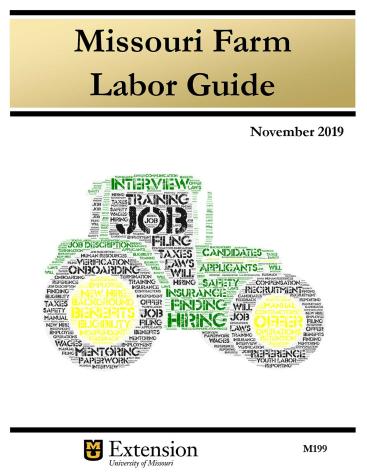COLUMBIA, Mo. – As the school year ends, you can expect young people to start applying for summer jobs. For agricultural employers, these young workers can provide extra capacity at a time when farms and agribusinesses often have more work than they have employees to get that work done.
“Labor is tight as the economy picks up steam post-pandemic. Fast food and manufacturers are begging for older teenagers,” says Joe Horner, University of Missouri Extension agricultural economist and a co-author of MU Extension’s Missouri Farm Labor Guide. “As farmers hire young workers, keep in mind the need to keep them safe, provide extra guidance and obey labor rules.”
Hiring a young person as a summer employee may have benefits that outlast a single summer, Horner says.
“By hiring young workers, farmers can help train the next generation in agriculture and create a labor pipeline that can support their business in the future,” he says.
Consider these guidelines before hiring young people to work for your farm or agribusiness this summer:
Delegate appropriate tasks. Employees age 16 and older may do any type of farm work, according to the Fair Labor Standards Act. However, restrictions apply to workers younger than 16. For example, younger workers may not do hazardous jobs unless permitted by an exemption. Hazardous jobs include operating a tractor with more than 20 PTO horsepower, hay mower, hay baler or forklift and working in a yard, pen or stall that has a cow and newborn calf with its umbilical cord still intact. Always prioritize creating a safe work environment.
Schedule youths to work at acceptable times. In Missouri, 14- and 15-year-olds employed during the summer — June 1 to Labor Day — may work only between 7 a.m. and 9 p.m. when school is out of session.
Comply with working hours rules. If school isn’t in session, 14- and 15-year-olds may work up to eight hours per day and six days per week to a maximum of 40 hours in a week.
Secure a work certificate as needed. Hiring a 14- or 15-year-old requires a work certificate. The young person should request the certificate from an issuing officer, such as the student’s school superintendent or principal. As part of the request, employers must submit a statement of intention to employ that includes a position description and information about the young person’s work schedule. The work certificate must be complete before the work start date. Keep work certificates and youth employee names, addresses, ages and daily work schedules on file for at least two years.
Pay at least the minimum wage. Missouri’s 2021 minimum wage is $10.30 per hour. Some exemptions apply. For example, the Fair Labor Standards Act exempts agricultural employers who record 500 or fewer “man days” during a given calendar quarter within the past calendar year. Agricultural work conducted by an employee for at least one hour in a day counts as a “man day.”
In situations where children work for their parents, Missouri’s child labor laws vary. To be exempt from the state’s child labor laws, a parent or legal guardian must own the business where the child works and have direct control of the child during work.
Find more information about hiring youths and managing a labor force in the Missouri Farm Labor Guide, available for download at extension.missouri.edu/publications/m199.
